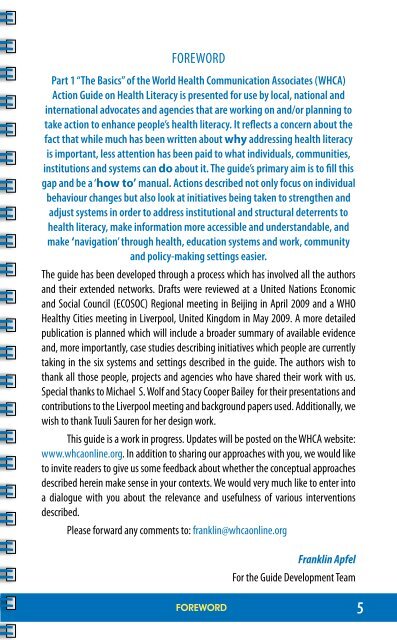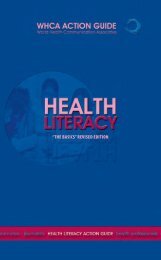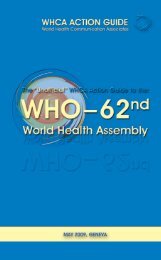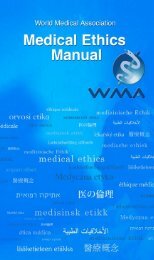Part 1 'the basics' - World Health Communication Associates
Part 1 'the basics' - World Health Communication Associates
Part 1 'the basics' - World Health Communication Associates
You also want an ePaper? Increase the reach of your titles
YUMPU automatically turns print PDFs into web optimized ePapers that Google loves.
FOREWORD<br />
<strong>Part</strong> 1 “The Basics” of the <strong>World</strong> <strong>Health</strong> <strong>Communication</strong> <strong>Associates</strong> (WHCA)<br />
Action Guide on <strong>Health</strong> Literacy is presented for use by local, national and<br />
international advocates and agencies that are working on and/or planning to<br />
take action to enhance people’s health literacy. It reflects a concern about the<br />
fact that while much has been written about why addressing health literacy<br />
is important, less attention has been paid to what individuals, communities,<br />
institutions and systems can do about it. The guide’s primary aim is to fill this<br />
gap and be a ‘how to’ manual. Actions described not only focus on individual<br />
behaviour changes but also look at initiatives being taken to strengthen and<br />
adjust systems in order to address institutional and structural deterrents to<br />
health literacy, make information more accessible and understandable, and<br />
make ‘navigation’ through health, education systems and work, community<br />
and policy-making settings easier.<br />
The guide has been developed through a process which has involved all the authors<br />
and their extended networks. Drafts were reviewed at a United Nations Economic<br />
and Social Council (ECOSOC) Regional meeting in Beijing in April 2009 and a WHO<br />
<strong>Health</strong>y Cities meeting in Liverpool, United Kingdom in May 2009. A more detailed<br />
publication is planned which will include a broader summary of available evidence<br />
and, more importantly, case studies describing initiatives which people are currently<br />
taking in the six systems and settings described in the guide. The authors wish to<br />
thank all those people, projects and agencies who have shared their work with us.<br />
Special thanks to Michael S. Wolf and Stacy Cooper Bailey for their presentations and<br />
contributions to the Liverpool meeting and background papers used. Additionally, we<br />
wish to thank Tuuli Sauren for her design work.<br />
This guide is a work in progress. Updates will be posted on the WHCA website:<br />
www.whcaonline.org. In addition to sharing our approaches with you, we would like<br />
to invite readers to give us some feedback about whether the conceptual approaches<br />
described herein make sense in your contexts. We would very much like to enter into<br />
a dialogue with you about the relevance and usefulness of various interventions<br />
described.<br />
Please forward any comments to: franklin@whcaonline.org<br />
Franklin Apfel<br />
For the Guide Development Team<br />
Foreword<br />
5






